Jan 18, 2025
Rajashree
Baskaran
Rajashree ‘Raji’ Baskaran is the founder and CEO of Project Karna – verifying trust in the age of artificial intelligence through real-time deep fake detection. She is also the Founding Partner at Superbloom Studios – providing an inclusive lens to frame problems and solutions, unleashing large latent potential. Raji is an active advisor and investor. She in an Alum of IIT Madras and Cornell University.
One Line Life Lessons from Rajashree
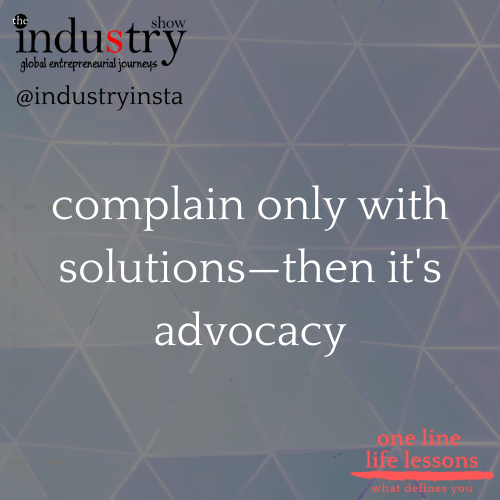
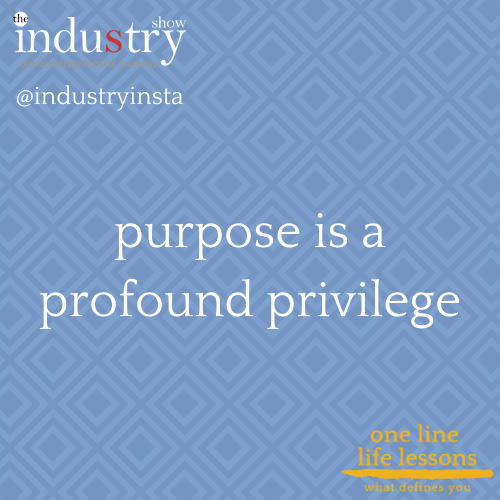
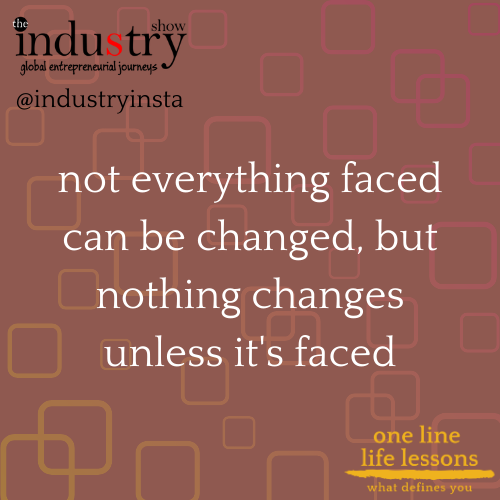
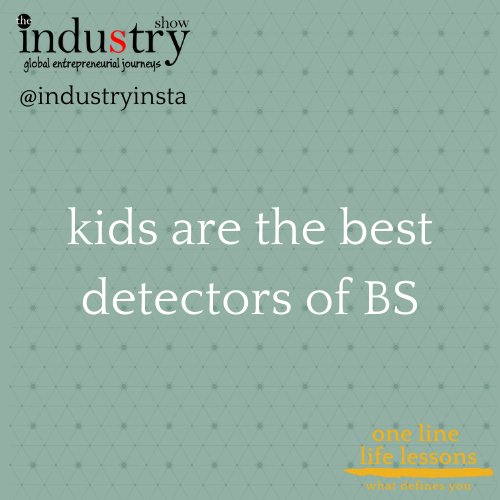
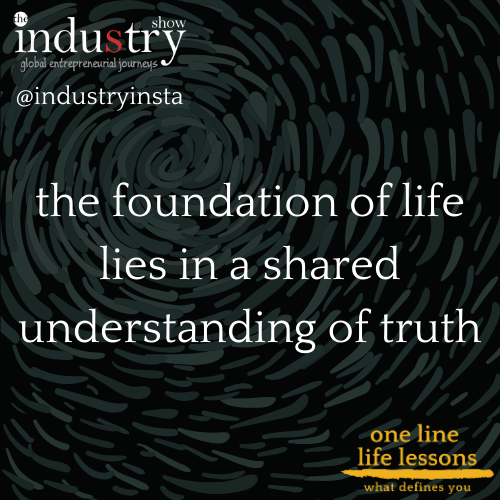
Episode Highlights
0:00 – Introduction to Trust in Professional Relationships
- Raji Baskaran opens the discussion by emphasizing the critical role of trust in professional settings, especially against the backdrop of rapid technological advancements and generative AI.
2:15 – Introduction of the Karna Project
- Baskaran introduces the Karna project, aimed at fostering trust in remote and hybrid work environments to address the challenges technology poses in replicating authentic human interactions.
4:30 – Challenges of Real-Time Communications
- She highlights that a significant portion of the workday involves real-time audio and video communications, which can often be misused, underscoring the need for enhanced security and visibility.
6:45 – Importance of Transparency in Workflows
- The discussion shifts to the integration of agents into workflows, where Baskaran stresses the necessity of transparency to build organizational trust.
8:00 – Major Threats to Businesses
- She identifies three primary threats facing businesses: financial loss, intellectual property theft, and reputational damage, particularly in sensitive transactions.
10:15 – Complications from Deepfake Technology
- Baskaran addresses the challenges that deepfake technology presents, complicating client education on associated risks.
12:00 – Introduction of Karna Red Platform
- To combat these challenges, she proposes the Karna Red platform, designed to help organizations identify vulnerabilities and encourage incremental problem-solving.
14:30 – Collaboration
- The conversation explores a collaboration with a remote-first company, which aims to enhance human-bot interactions by suggesting bots should verify identities instead of humans.
16:00 – Fostering Human Connection in Remote Work
- Baskaran emphasizes the need to foster human connection and positive reinforcement in remote work environments.
18:00 – Reflections on Career Journey
- She shares personal reflections on her career journey, viewing setbacks as valuable learning opportunities and focusing on personal growth over mere outcomes.
20:15 – Personal Interests and Insights
- Baskaran discusses her interests in outdoor activities, cooking, and writing, mentioning the documentary “Coded Bias” and David Graeber’s “Bullshit Jobs.”
22:00 – Life Lessons on Advocacy and Meaningful Work
- She conveys key life lessons about advocacy, the pursuit of meaningful work, and the importance of facing challenges for instigating change.
24:00 – Work-Life Integration and Family Insights
- Baskaran highlights the value of integrating work and family life, drawing insights from her children.
26:30 – Excitement for Leadership Role with Karna
- She expresses her excitement about her leadership role with Karna amidst the uncertainties of the evolving workplace landscape.
Show Transcript
Transcript - Full Episode
[00:00:02 – 00:00:11] Nitin Bajaj
Hey, everyone. Welcome to the industry show. I’m your host, Nitin Bajaj. And joining me today is Raji Baskaran. Raji, welcome on the show.
[00:00:11 – 00:00:12] Raji Baskaran
Thank you, Nitin.
[00:00:13 – 00:00:17] Nitin Bajaj
Great to have you here. So let’s start with the big question. Who is Raji?
[00:00:19 – 00:01:05] Raji Baskaran
Yeah. Good question. I think, if I were to state it very briefly, I’m a very curious person who, has not been afraid to challenge status quo. That’s one of kind of being a defining personality, both personally and professionally. I’ve been a builder for most of my life, almost all of my professional life. I build Project. And after 2 decades of building products and scaling, one of the big moments is that, you know, I think building communities along with building products is way more meaningful. So I’ve been intentionally also building communities. So in general, I love building and creating things when it didn’t exist before or something.
[00:01:06 – 00:01:18] Nitin Bajaj
That’s amazing. Now you are building something. So tell us what Karna is and, more importantly, why build this and, why now?
[00:01:19 – 00:02:57] Raji Baskaran
Yeah. Thanks for giving an opportunity to talk about Karna. Karna’s mission is to build and keep trust in working relationships between people. We strongly believe that trust is fundamental to all human interactions. And post gen AI wave, as you you know, we are all living in this world where things are moving very fast in terms of technology, the ability to create a very similar looking clone of any human, is really challenging our notions of trust. And we believe and we are building Karna with me and, my team in order to bring trust and this groundedness back to human relationships. We are not gonna go back to the age of doing everything in person. Right? Remote, hybrid, distributed work is here to stay, and hence, we believe that it’s a very, very needed, solution in the post gen AI world. And that’s kinda why now because, I have told myself that when I, see the problem that I don’t I wanna wake up and think about and work on every day for a decade plus, then I will surely build my own. And I cannot really imagine a bigger problem or a, you know, better time for, you know, based on what’s happening around us to be building this. And I feel very privileged that I get to do this because I have the skills and the team, that can actually tackle this very hard problem in a meaningful way.
[00:02:57 – 00:03:04] Nitin Bajaj
I like to say you have the unfair advantage to be the one to do this. You know, we typically talk
[00:03:04 – 00:03:24] Raji Baskaran
about sometimes I like that because it feels like my whole career has been set up to do this in a way that obviously I did not see this coming when I started my career. But, yes, it is a it is a big privilege. It is very scary where the world is going, but it’s a big privilege to also work on this problem.
[00:03:24 – 00:04:03] Nitin Bajaj
Yeah. The bigger the opportunity, the bigger the scope. And, you know, what I’m curious to hear is we typically talk about the impact, product, a company, a nonprofit has created. But given that you’re in the early stages, what I would love to hear instead is what is the possible impact? What are we protecting against? Because, you know, that’s that’s really what you’re building for and why you’re building it. So give us a sense for the size, scale, and the potential impact of, what is to come.
[00:04:04 – 00:04:47] Raji Baskaran
Yes. Yes. Absolutely. So I think there are, you know, multiple vectors we can think of this with, but even in a very narrow focused way of thinking about real time audio and video communications like this call that we are having. Of course, I know you in person. Mhmm. And, you know, there is a very different dynamics there than if I didn’t know someone in person. But it’s estimated that very conservatively, 15% of every working person’s work day and work life on an average goes in online Mhmm. Audio or video communications. Think about the number of people who are working in the world, professionals. Think about the number of hours we work
[00:04:47 – 00:04:48] Nitin Bajaj
Mhmm.
[00:04:48 – 00:08:32] Raji Baskaran
On an average, and take 15% of that. That’s 1,000,000,000 and 1,000,000,000 of minutes that we spend in this mode of connecting, communicating between a few or many. But, you know, we can even constraint to just few in this case, not one to many, but, you know, one to 1 or one to few meetings that are all under threat. There maybe some of those people, some of those audio and video are all Maya. Right? Are all in Mhmm. Are all fixed. That’s profoundly impactful to how we you’re gonna do business and how we are gonna actually, like, you know, just have human to human communication. So being able to provide a solution that works in real time, that gets integrated into your work stack so you don’t even know it’s running in the Baskaran, and can give this extra layer of visibility for each person to know that they are indeed really talking with a human, I think, is of immense value and impact. And it’s almost a nonnegotiable. Right? So imagine a future, and I’m not an, by any chance, an anti technologist or anti AI or anti anything, because I live in this world, and I am actually very excited about all the amazing positive things that we can do with AI. But when a technology is moving this fast, people with bad intention and or people who don’t have to operate under any rule of law tend to use it, all these technologies, way more creatively Mhmm. Because they don’t have guardrails that they have to worry about. Right? So that’s kind of where we feel like we have to move very fast as well to protect ourselves against this. So I I I really believe that the first order impact we wanna measure is the number of little minutes of human communication that we can secure and give guarantees that, you know, they feel safe, that they are in a safe place. And then, over the longer term, Karna’s mission is to be beyond that. Right? We believe that there will be agents that are doing useful but repetitive and chores that are not necessarily very high value add for humans. And it’s okay, and it’s actually very welcome for that those agents to be integrated into our workflow, but we just need that transparency. Mhmm. Right? And Karna wants to be that layer which will build that trust by building the transparency. Hey. This is an agent allowed for this reason in this meeting, but this is the real Nitin, and this is the real Raji. Right? And we all have our role and our purpose in this conversation. Right? So that’s that’s the future we are imagining. In terms of, like, you know, our approach to where we Karna go, we wanna start with organizations and business processes that are under the big threat initially. Mhmm. Right? And they fall under 3 categories. 1 is loss of money, obviously. Right? I mean, that’s literally, like, one of the biggest threat is you can be easily fooled into, giving up actual cash in some form. The second layer is loss of IP Mhmm. Or proprietary data in a business organization. Again, we all know that data and IP is future money. Right? So that’s directly the third one is a little bit harder, but you know, to quantify, but very, very critical is the loss of reputation
[00:08:32 – 00:08:33] Nitin Bajaj
Mhmm.
[00:08:34 – 00:09:27] Raji Baskaran
Which can have huge impacts to businesses. And, but it can come also in huge number of flavors, and that’s the hardest one in terms of being, able to protect against. But we feel like these are the three things. So if your business processes, if you move a lot of money routinely across international teams and, you know, and approve large POs and things over audio and video calls, you’re probably under the biggest threat. Or if you discuss core IP or, you know, data processes, or share data remotely, which is all of us, you know, if we work, you know, then I think that’s under threat. Right? And then if you think you are executives being misrepresented to then change the reputation of your company, that can significantly affect the future of your company, then I think also you need to consider how you can protect yourself. True.
[00:09:28 – 00:10:07] Nitin Bajaj
And I would say, you know, even though it’s harder to estimate, the loss of reputation problem doesn’t is not restricted just to businesses. It could impact governments. It could impact a lot of sociopolitical and economic, at the macro level. So, yeah, it’s it’s a massive problem even though it’s hard to put a number and probably that’s why it’s hard to put a number around it. Now as you’re working through all of these different things, everything is changing by the hour literally, and that’s no exaggeration. What’s the one big problem you are facing that you would like to call out?
[00:10:08 – 00:10:36] Raji Baskaran
Yeah. The instinct says that maybe like this cat and the mouse game of deepfakes getting better and Mhmm. You know, finding the algorithmic ways to catch it, getting diff actually, I feel more comfortable with that. It’s funny, but I feel like I can handle that complexity. The biggest challenge is most of our, you know, customers have this deer in the headlights
[00:10:36 – 00:10:37] Nitin Bajaj
Mhmm.
[00:10:37 – 00:10:51] Raji Baskaran
Type of problem. Right? It’s such a big problem. It’s coming and hitting some them so close to how they operate Mhmm. And it’s so bright. They all believe this is a problem. They don’t know what to do about it.
[00:10:51 – 00:10:52] Nitin Bajaj
Right.
[00:10:52 – 00:12:24] Raji Baskaran
They don’t know how to handle. They in larger organizations, they don’t know who is the owner of this. Is this a CFO problem Mhmm. Because it’s fraud. Is it a c I a CTO problem because there’s IP? Is this a COO problem because there’s reputation of the CEO? And then, like, think about all kinds of other, you know, integrations needed to secure this. So in some sense, I think one of the biggest thing is to, reduce the complexity of the actions that need to be taken. So one of the things we did after having 50 plus conversations with our customers is that, we decided to build a platform called Karna Red Mhmm. Which is a red teaming platform where we can give a tool for the teams to evaluate where are the weakest links in their own business profiles and in the way they do business today and start at the weakest link rather than think that this is such a big problem or I gotta revamp everything that I do instead, like, you know, go and target, like, you know, what is the first thing I can do? What is the smallest unit of, you know, work I can do to get the biggest benefit from a weekly Project? So so my biggest challenge is this is such a big problem, and it’s coming really, really fast. Yes. People. So building them tools to, you know and it’s a it’s a learning curve with the customers and us. Right? So we we also Karna be very, adaptable and actually meet the market where they are in terms of being able to, deal with this situation.
[00:12:26 – 00:12:40] Nitin Bajaj
Now the flip side of challenges are opportunities. And obviously there’s a huge one here, but I would love for you to call it out and say, you know, what’s the one most exciting opportunity that, you see ahead of you?
[00:12:41 – 00:13:51] Raji Baskaran
I think one of the most exciting opportunities is really providing value to remote first companies that are growing very fast. Right? Because for them, this trusted relationship with between colleagues is their key business advantage. And for them, there’s no plan b, plan c, plan d, where we’re like, oh, you know, the key decision makers are also my friends of 20 years. So I have four numbers for them. I will check them. Those things don’t exist. Right? So we want to go after, companies for whom having that trusted relationship between colleagues is like a nonnegotiable for the way they operate and the way they grow. And I think that’s actually a very large percentage of growing organizations in the world. But beyond that, we also believe that there is this idea of, you know, being the mediator of kind of the human connection has something that’s beyond, like, the protection, fraud, anti fraud, but also a positive angle, which is
[00:13:51 – 00:13:52] Nitin Bajaj
Mhmm.
[00:13:52 – 00:14:53] Raji Baskaran
Can I also integrate within these 2 ways to enhance the human relationship between the people? So we are actually working on a module with the early adopter. On who is fully remote first company on how do we make sure we don’t ask humans to do at all anymore? Humans should not be asked to keep proving they are humans. Bots should be made to prove that they are bots. Right? So that’s a fundamental reframing in our overall approach. But we’re like, how do we kind of reward humans when they show more humanity, like, to make them more human? Don’t make them do more touches. Do the opposite. Right? Actually, how do we get more human connection? I can’t talk about it yet till it’s out, but our idea is that we think that we also want to do positive reinforcement in relationships in remote work culture, not just always about, like, oh, report. This looks like a deep fake or you know? Like, not always under this threat model, but also, like, really, enhance the past relationships.
[00:14:54 – 00:15:31] Nitin Bajaj
That’s a fundamental shift that, I agree with you. It’s it’s much needed, and, I’m glad somebody is thinking about it. And there’ll be some good outcomes from all of this. Now I like to, as we look forward, pause and Project. And I would love for you to share 2 moments from your career or personal life. 1 where things did not work out as you had expected. There was failures, lessons. And another where things exceeded your own expectation and became a success beyond your imagination.
[00:15:33 – 00:19:19] Raji Baskaran
Oh, there’s plenty of both. And so and as a matter of fact, I believe that failures are, like, actually much better lessons and, much, you know, frankly, better memories for me over time than, it’s, than sex assists. And I do I have been told multiple times I should slow down when I do have success and celebrated, but I tend to move on to the next one quite often. The next challenge, a very old one, but obviously it’s left enough of impression on me to remember after all these years. So I’ll tell that, and it’s also, probably, I was a fairly good student growing up in school. And, my, you know, I did not have a lot of pressure one way or the other, but I was like, you know, doing quite well. And it was quite a bit of surprise that I actually ended up doing really badly in the finals of the high school finals in, math, particularly. And, that was a big, you know, measurable failure. And it took me a while, and as you know, like, you know, for other people who are not from India, that determines, like, a lot of your future career options in India. That’s the one score that literally determines what colleges you can go to and so on. So it did change a lot about my own idea of who I was or what I Karna be and things like that. But, it took me a few months, but I reflected. And what I’m proud of today after, you know, many decades is that I really believe that that did not reflect anything about who I, I was, either my aptitudes or my attitudes, and that it was just a bad day. Or at worst, it was a bad sequence of preparation for a few months leading up to the exam. And that by any means, even then I had the maturity to say that does not define who I was or what I was capable of. And then after a few months, I put my heads down and decided to write the one entrance exam that does not take into account your high school grades. And I ended up getting into IIT. So it’s completely a lot of people may not believe me. The only reason I wrote the JE was to prove to myself that I can do math and nothing more, nothing less. And maybe a little bit to my dad because it’s like, maybe J is like, has some biases because there’s always so few girls in it. And that the teenage strategy didn’t like it either, but that was not even that important. What was more important was really, that I proved to myself that I can do it more than anything else. And I felt that that’s a really important lesson, and I actually distinctly remember feeling completely not happy, not elated, but just satisfied in a level like I had never done before after finishing my day. Because not because I knew I’ll get in, but because I was very sure I’d given my best. And that’s the feeling, like so I feel like and, you know, in terms of that itself is a story of what also went you know? I I mean and after that, I failed a lot too. So I failed a lot in I still ended up getting it into Cornell. So I think most of my, story has been where you, you know, don’t let small setbacks define, what you are capable of. Mhmm. In the longer term has been kind of part of the story. And in general, what I’ve learned is one of the patterns is that, I do like to push boundaries both. You know, physical. And the the more ambitious and more boundary pushing you are, the more you’re gonna potentially feel.
[00:19:20 – 00:19:20] Nitin Bajaj
Yep.
[00:19:21 – 00:20:01] Raji Baskaran
And, that’s, that’s okay. Kind right? But that’s, that’s really, one of the things that, you know, I feel like, lesson and and one of the things that I’ll say at the follow-up is that lot of, I do a lot in terms of inclusivity, particularly, you know, women in tech and science and things like that. And a lot of the allies, men ask me what is the best thing they can do. And one of the advice I give is tell all the way times and ways you failed and how you are got where you are today in spite of it. Because that’s not that’s what is not spoken about very often is, you know, that you can fail sometimes and still be successful in the long run.
[00:20:01 – 00:20:29] Nitin Bajaj
So true. And, thanks for sharing that because it’s, 1, not easy to go through those experiences, but, 2, even less so to share that and share it in a public forum. So I really appreciate you providing that visibility. I like to ask people what do they do for fun to kick back, relax when you know, which is also difficult, given most entrepreneurs are type a personalities. But
[00:20:29 – 00:21:34] Raji Baskaran
Well, I have to do it with the work. So most of the time, if you were not recording this on video, I might have taken it walking. I I love to walk and I like to walk in nature if I can find a park or whatever nearby. Like to bike, but, you know, I live in Portland, Oregon, which is a great bike turn, but it’s also very wet. And I’m like a woods in layering up and all that. My my 12 year old gets me out enough, but not enough. I love to grow tomatoes and cook. So these are all things that I do need a physical space to do. I also do a little bit of writing, but I haven’t done it in a long time recently. I something clicked in my brain that I actually like to write when I’m in a plane, especially if I’m in a plane and there’s nobody in the middle seat next to me. So I’ve been, trying to build my habit back of writing more, recently when I’m stuck in those kinds of spaces. But generally, I really like cooking. And so, extensions of it is a little bit of gardening, a little bit of entertaining so that I know I have something to cook and I have somebody to eat it.
[00:21:36 – 00:21:42] Nitin Bajaj
That’s amazing. Now any book or a podcast that, you’d like to recommend?
[00:21:43 – 00:23:51] Raji Baskaran
Absolutely. I mean, there’s lots of amazing content. So the problem is always I really love this documentary, called Coded Bias by Jay Bawlambini. She’s amazing. She also has other amazing content. So if you want, to understand more about, the subtlety of AI in the real world and understand how complex it is to do the right thing using this technology and how you can give, you know, the power to people for this technology. She’s a great role model. A little bit on tangentially, another book that I’ve been reading, that I know is not at all related to AI, but I’ll connect it to it, is, by this philosopher, Braver. He’s, no more. He passed away, unfortunately, very young, but, called Bullshit Jobs. There’s a book. It was also an article, so the article is much easier and smaller to read. That’s fine. The book is just an expansion of it, where he defines these categories of jobs we have created as a society that doesn’t have to exist for a bigger purpose. And I’ll tell you what’s the connection, I think, to AI. And particularly, the way I am thinking about future of work and future work and AI and AI agents and things like that is that I believe that, truly, if AI agents can replace many of these jets and give the humans more purpose. In their work, then we would have achieved, like, a really good equilibrium new equilibrium. And it’s not always saying no to technology or no to new and very fast moving technologies, but understanding how that fits into society and how that fits into the way we think about work and life. So it’s a little bit offbeat book for an AI person, but it’s like, I think, a good framework to understand how do we approach this idea about agents and what should agents replace and what should humans, you know, do.
[00:23:52 – 00:24:11] Nitin Bajaj
Well, thanks for those recommendations. I’ll personally check out the, the article because it seems very relevant to me in the times we are in. So thank you for sharing that. Now onto my favorite part of the show, we call it the one line life lessons. Raji, would love to hear your life lessons.
[00:24:12 – 00:26:10] Raji Baskaran
Absolutely. K. Okay to complain, but only when you have specific proposal for change. Then it’s not complaining. It’s advocacy. I truly believe that purpose is a big privilege. So if you are able to work with a purpose, understand that it’s a privilege and don’t, you know, waste it. I love this James Baldwin quote. Not everything that is faced can be changed, but nothing can be changed until it’s faced. It’s very profound. It’s been very you know? A very, fun one is kids are the best BS detectors and feedback givers. Have them around and listen to them. So I believe in work life integration. So most often, if my kids are around, they walk in and they, you know, they I integrate them in my work life. The last one, I’m gonna switch to my mother tongue, which is Tamar. And there is a pre independence era poet who was very prolific, in spite of, his very short career called Baradiyar, and I love his poetry. And one of his, one of his very small prayers for the world, it starts with a personal prayer but ends with a prayer for the world, ends you know, it says about how how you have strength of mind and all that, but it ends with one sentence. That means the truth needs to stand for everything else that he has to be meaningful. And the foundation of everything else that we have in life is having a common understanding of truth. And I believe that that’s actually very, very meaningful in today’s world and in what, you know, we are trying to build with Karna. I
[00:26:10 – 00:26:59] Nitin Bajaj
love that. And I love the that it came full circle. So, Raji, thank you so much for making the time to share your journey and story. Really excited to see, what you and the team are building with Karna. I think it’s very timely, very, appropriate, and, the most exciting part is, the leadership. You and the team have the right type of experience going into this. So as many unknowns as coming along with this, I think we have the right people to take advantage of and bring this to life. So super excited. Many congratulations and looking forward to seeing all the progress and the success that comes with this.
[00:26:59 – 00:27:08] Raji Baskaran
Thanks, Nitin. I really appreciate you and what you’re doing for the community. Keep doing more of this. Love to see this. Thank you very much for this opportunity.
[00:27:08 – 00:27:09] Nitin Bajaj
Thanks, Raji.



